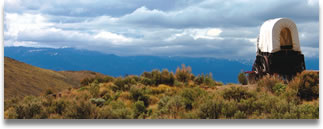by Rev. Thomas E. Engel
Imagine it is 1840. Like many others, you have escaped a famine or a revolution in Europe. You and your family are now immigrants in New York, and you live in a cramped apartment. The summer is hot, the city is dirty, and it stinks from overcrowding. You are working 12-hour days in a factory, and you still do not make enough money to put a decent meal on the table for your family.
One day you find a flyer advertising a place called the “West,” where the land is so fertile that all a person has to do is throw seeds on the ground and crops will grow abundantly. You tell your family to pack their belongings, and you start your journey. But soon you find that the way is tough. You cross wide rivers, traverse muddy trails, and face a hostile land.
Ever since the Fall, life has been hard. Each generation has faced the challenges of its time. Today, workers are being laid off and retirees are losing their savings. It seems like we are getting less in this land of plenty. So how do we get through these tough times?
Before we answer that question, let’s look at how we maybe got here in the first place. A friend, who is a bank president, wrote about our troubles in a local newsletter: “This financial crisis is what happens when unrealistic expectations of perpetual prosperity meet unrestrained corporate greed.”
Read 1 Tim. 6:6–10. From this verse, would you say our current economic problems come from sin? If so, what sin?
_____________________________________
_____________________________________
The story of Achan is the story of one man’s sin and how it harmed an entire nation. Read Joshua 7. What did Achan do, and what were the consequences?
_____________________________________
_____________________________________
Because God saw all of the people of Israel as one, when one person sinned, that sin hurt all the people.
We are a wealthy nation, but with wealth comes responsibility. What does 1 Tim. 6:17–19 have to say about how the rich are to act? What is the life that Paul is instructing Timothy to have?
_____________________________________
_____________________________________
Read Luke 12:13–21. Fool is a strong word. Why does God call a person who trusts in money a fool?
_____________________________________
_____________________________________
Now read Luke 12:22–34. On what are we to focus, and what comfort can we gain from Jesus’ words?
_____________________________________
_____________________________________
A few years ago, I visited a museum display about the Oregon Trail. There were many accounts of going through rough mountain passes and wagons breaking down as wheels jarred against sharp rocks. In their diaries, some pioneers complained about the hardships; others took it all in stride.
Read 2 Cor. 11:24–28. What situations did St. Paul face?
_____________________________________
_____________________________________
Now read Phil. 4:10–13. What does Paul say he has learned?
_____________________________________
_____________________________________
We can take Paul’s words for our own. With St. Paul we can answer this question with confidence: How does my union with Christ help me get through this tough time?
 |
istockphoto.com |


